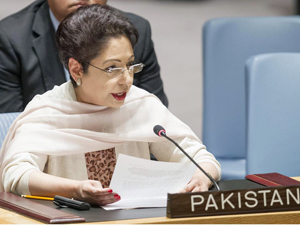United Nations, Jun 23: Taliban "safe havens" are inside Afghanistan not outside, Pakistan`s Ambassador to the United Nations Maleeha Lodhi has said.
"The resilience of the insurgency led by the Taliban cannot be explained away by convenient references to external `safe havens` or `support centres`," Lodhi told the 15-member UN Security Council during a debate on Afghanistan on Wednesday.
Relations between the two countries have turned sour since Afghanistan`s President Ashraf Ghani accused Pakistan of waging an "undeclared war of aggression" against his country, Dawn reported on Thursday.
Pakistan, Lodhi asserted, was committed not to allow its territory to be used for terrorism against other countries.
"Pakistan`s Zarb-e-Azb and subsequent Raddul Fasaad military operations had succeeded in eliminating all terrorist and militant groups from its tribal territory bordering Afghanistan," she said.
She told the Council that Islamabad was "implementing border controls, including the fencing and monitoring of vulnerable sections of the Pakistan-Afghanistan border."
Lodhi said that "as a country that continues to host over two million Afghan refugees, Pakistan expects gratitude and not hostility from the Afghan government".
Both the countries, she stated, have suffered at the hands of terrorism and should cooperate with one another in order to eliminate terrorism from the region.
Lodhi said that apart from Afghanistan itself, there is no country other than Pakistan, which has suffered more from the wars and violence that have engulfed Afghanistan for over 35 years.
"There is no other country, which will gain more from peace in Afghanistan," she said.
Lodhi added that a political strategy is needed since it was impossible to reach a political solution with only an increase in troops and military involvement.
On his part, Afghanistan`s Ambassador Mahmoud Saikal said reversing the tide against terror was contingent on eliminating support centres beyond the country`s borders that produced, nurtured and empowered terrorists operating in Afghanistan.





Comments
Add new comment